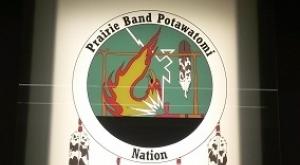
20140819_084957_0
Place Categories: Domestic Violence & Sexual Assault and Tribal Constitutions & CodesPlace Tags: Acoma Pueblo
The Prairie Band Potawatomi Nation’s ,Domestic Violence Criminal Code aims to send the message that domestic violence will not be tolerated by the Nation. By clearly defining the crime of domestic violence and establishing mandatory sentencing provisions—including fines and batterer intervention programming—the Nation is better able to protect and support victims of abuse, hold offenders accountable, and deter future incidents of domestic violence.
Program Running Length:
2007 – Present
Location:
The Prairie Band Potawatomi Nation is located in northeastern Kansas, roughly 30 miles north of Topeka and 90 miles west of Kansas City.
Land Characteristics:
The reservation encompasses an 11-square-mile contiguous rural land base.
Population:
There are approximately 5,000 enrolled members of the Prairie Band Potawatomi Nation. Two thousand of these members live on or near the reservation. There are three other resident tribes nearby: Kickapoo Tribe, Sac and Fox Nation, and Iowa Tribe of Kansas and Nebraska. Some members of these other tribes live within the service area of the Prairie Band Potawatomi Nation.
Until 2007, perpetrators of violent crimes against family or household members on the Prairie Band Potawatomi Nation were charged with “simple assault,” as the Potawatomi Law and Order Code lacked specific domestic violence provisions. The community felt that “simple assault” did not adequately reflect the seriousness of domestic violence. In addition, this charge failed to address forms of domestic violence that do not involve assault. Therefore, the Nation’s governing body, the Tribal Council, approved the development of a Domestic Violence Criminal Code.The Domestic Violence Criminal Code was established to better protect victims of domestic violence, increase accountability of offenders, and decrease incidents of domestic violence within the tribal community. The Code applies to members of any federally recognized tribe who commit specified domestic violence offenses on tribal lands. Each year, the tribal prosecutor’s office files a total of 50 criminal cases, of which approximately 10 involve domestic violence charges.
With the implementation of the Domestic Violence Criminal Code, the Prairie Band Potawatomi Nation sends the message that domestic violence will not be tolerated in the community and that offenders will be held accountable for crimes of domestic violence.
The Domestic Violence Criminal Code was designed to impose strict criminal penalties on offenders while also offering offenders opportunities for growth through mandatory participation in a batterers intervention program. The batterers intervention—T.R.A.C.K.S. (Traditions, Respect, Accountability, Change, Knowledge, and Safety)—is run by the Nation and is trauma-informed. It is based in part upon the work of the Family Peace Initiative of Topeka and incorporates elements of the Duluth Model. The program is 32 weeks long and includes an assessment and two orientation sessions.Statutory Provisions
The Domestic Violence Criminal Code (15-2-35) is divided into three sections.
- Section A: This section establishes the crime of domestic violence, which involves intentionally causing or attempting to cause harm to a family or household member by inflicting: 1) physical harm, 2) reasonable fear of imminent physical harm, 3) substantial emotional distress, and/or 4) non-consensual sexual contact by use of force, threats, or duress.
- Section B: This section, titled “Definitions,” defines the terms used in Section A, such as family/household members, substantial emotional distress, and sexual contact.
- Section C: The last section of the code, titled “Criminal Penalties,” specifies the penalties for conviction. Penalties increase for second and third time offenders and may include fines, incarceration, participation in a batterers intervention program, and restitution.
Offenses can be “stacked,” meaning that an individual charged with domestic violence can also be charged with a separate offense, such as assault or rape.
The Port Gamble S’Klallam Tribe’s Probation Department oversees the Re-Entry Program and employs a program manager, case manager, mental health counselor, educational instructor, and cultural coach to provide direct services to program participants.Tribal resources and grant funding may be used, when available, to support the implementation and further development of the Domestic Violence Criminal Code.
During the drafting of the Domestic Violence Code, the Prairie Band Potawatomi Nation utilized the Tribal Law and Policy Institute’s National Tribal Court Clearinghouse to find model codes upon which to draw. Vivien Olsen, the tribal attorney, worked with a number of individuals and organizations, including the Kansas Coalition Against Sexual and Domestic Violence, for assistance with code development.
The Prairie Band Potawatomi Nation’s Tribal Council had long supported the idea of a domestic violence code and encouraged this project. In addition, the Nation’s victim services program has always worked diligently to educate the tribal community about domestic violence.Limited staff and competing work responsibilities presented challenges to the timely production of the Domestic Violence Criminal Code.
The Nation will continue to update and amend the Domestic Violence Criminal Code in order to maximize the Nation’s jurisdiction over offenders and promote safety for the tribal community.Most of the Nation’s domestic violence cases have resulted in convictions since the code was implemented. The tribal prosecutor believes that this increasing level of accountability has acted as a deterrent to domestic violence offenders.
The Nation was able to gain multiple domestic violence convictions against a repeat offender who had committed many crimes against the same victim. The case was later transferred to federal authorities for further prosecution, and the offender was ultimately sentenced to a lengthy period of incarceration in federal prison.
No Records Found
Sorry, no records were found. Please adjust your search criteria and try again.
Google Map Not Loaded
Sorry, unable to load Google Maps API.

